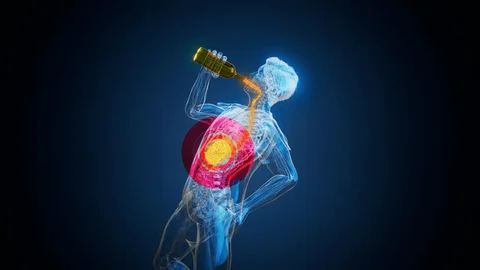Alcohol Detox & De-Addiction

Overview
Alcohol addiction is one of the most common yet misunderstood mental health conditions. What often begins as social drinking can gradually turn into dependence, affecting physical health, mental well-being, relationships, and work performance.
Alcohol addiction (Alcohol Use Disorder) is not a sign of weakness — it’s a chronic medical condition that alters brain chemistry and behavior. With the right psychiatric and medical care, complete recovery and sobriety are possible.
At Dr. Naazneen Ladak’s psychiatry clinic in Andheri, Mumbai, we specialize in Alcohol Detox and De-Addiction Treatment, combining safe medical detoxification, therapy, and long-term relapse prevention strategies — all in a confidential and non-judgmental environment.
Causes
Alcohol dependence develops from a mix of biological, psychological, and social factors.
Common causes include:
Genetic predisposition: Family history of alcoholism increases risk.
Stress and emotional distress: Drinking as a coping mechanism for anxiety, depression, or trauma.
Social pressure or lifestyle influences: Peer drinking or work-related habits.
Chemical changes in the brain: Alcohol triggers dopamine release, creating a false sense of relaxation and reward.
Co-existing mental health disorders: Depression, anxiety, or bipolar disorder can increase vulnerability.
Lack of emotional support or loneliness.
Understanding these causes helps the psychiatrist design a personalized de-addiction plan to address the root of the problem — not just the symptoms.
Symptoms
Alcohol addiction often develops gradually. Early recognition of symptoms is crucial for successful recovery.
Behavioral & Emotional Symptoms
- Increased craving or tolerance (needing more alcohol for the same effect)
- Loss of control over drinking habits
- Neglecting responsibilities at work, home, or school
- Drinking secretly or lying about alcohol use
- Irritability, anxiety, or depression when not drinking
- Withdrawal symptoms like tremors, sweating, or nausea after stopping
Physical Symptoms
- Frequent hangovers and fatigue
- Insomnia or disturbed sleep
- Loss of appetite or weight changes
- Liver damage symptoms (yellowing skin, abdominal pain)
- Poor memory, coordination, or judgment
If you or a loved one shows these signs, consult a psychiatrist for alcohol addiction in Andheri for professional evaluation and support.
Diagnosis
At Dr. Naazneen Ladak’s clinic, diagnosis involves understanding both the extent of alcohol use and underlying psychological factors.
The psychiatrist performs:
- Comprehensive case history – duration, frequency, and impact of drinking
- Physical and mental health assessment
- Screening for withdrawal risks before detox begins
- Evaluation for co-existing mental illnesses (like depression or anxiety)
- Laboratory tests (if needed) to assess liver and overall health
This detailed assessment ensures that alcohol detox and recovery are safe, supervised, and effective.
Treatment
Effective treatment for alcohol addiction requires a combination of medical detox, psychotherapy, and long-term relapse prevention.
1. Alcohol Detoxification (Detox)
The first stage involves safe removal of alcohol from the body under medical supervision.
Managed withdrawal with appropriate medication
Monitoring for complications like seizures or delirium tremens
Nutritional and hydration support
Detox is conducted either in a clinical setup or home-based (if mild) under psychiatrist guidance.
2. Psychiatric Evaluation & Medication
Anti-craving medications (like Naltrexone or Acamprosate) to reduce relapse risk
Anxiety and sleep management medication (if needed)
Mood stabilization for co-occurring depression or stress
3. Psychotherapy & Counseling
Cognitive Behavioral Therapy (CBT) to identify triggers and break the addiction cycle
Motivational Enhancement Therapy (MET) to build self-control and resilience
Relapse prevention sessions to handle cravings and emotional stress
4. Family Counseling
Addiction affects the entire family. Family therapy helps improve understanding, rebuild trust, and create a supportive home environment.
5. Lifestyle and Rehabilitation Support
Encouraging healthy routines, exercise, and mindfulness
Involvement in support groups or follow-up sessions for continued motivation
Stress management and emotional regulation training
With consistent support and professional care, patients can overcome alcohol dependence, rebuild confidence, and live a healthy, sober life.
When To Seek Help
You should seek help from a psychiatrist for alcohol de-addiction if you:
- Find it hard to reduce or stop drinking
- Experience withdrawal symptoms when not drinking
- Have health or relationship issues due to alcohol
- Feel anxious, depressed, or guilty after drinking
Professional intervention can make all the difference between ongoing struggle and lasting recovery.
Consult Dr. Naazneen Ladak – Psychiatrist in Andheri, Mumbai
Specialist in Alcohol Detox, De-Addiction, and Relapse Prevention
Take the first step toward recovery today — confidential, compassionate, and clinically proven treatment for alcohol addiction.

